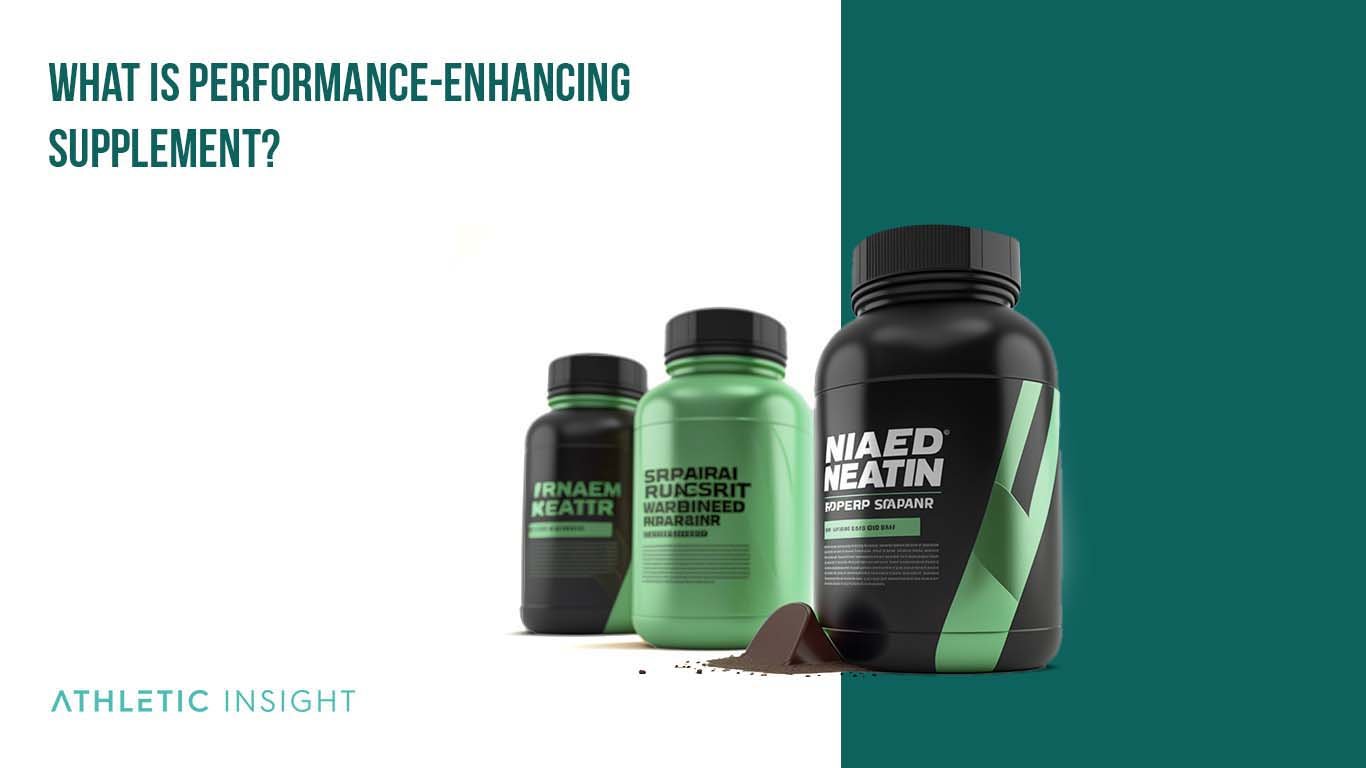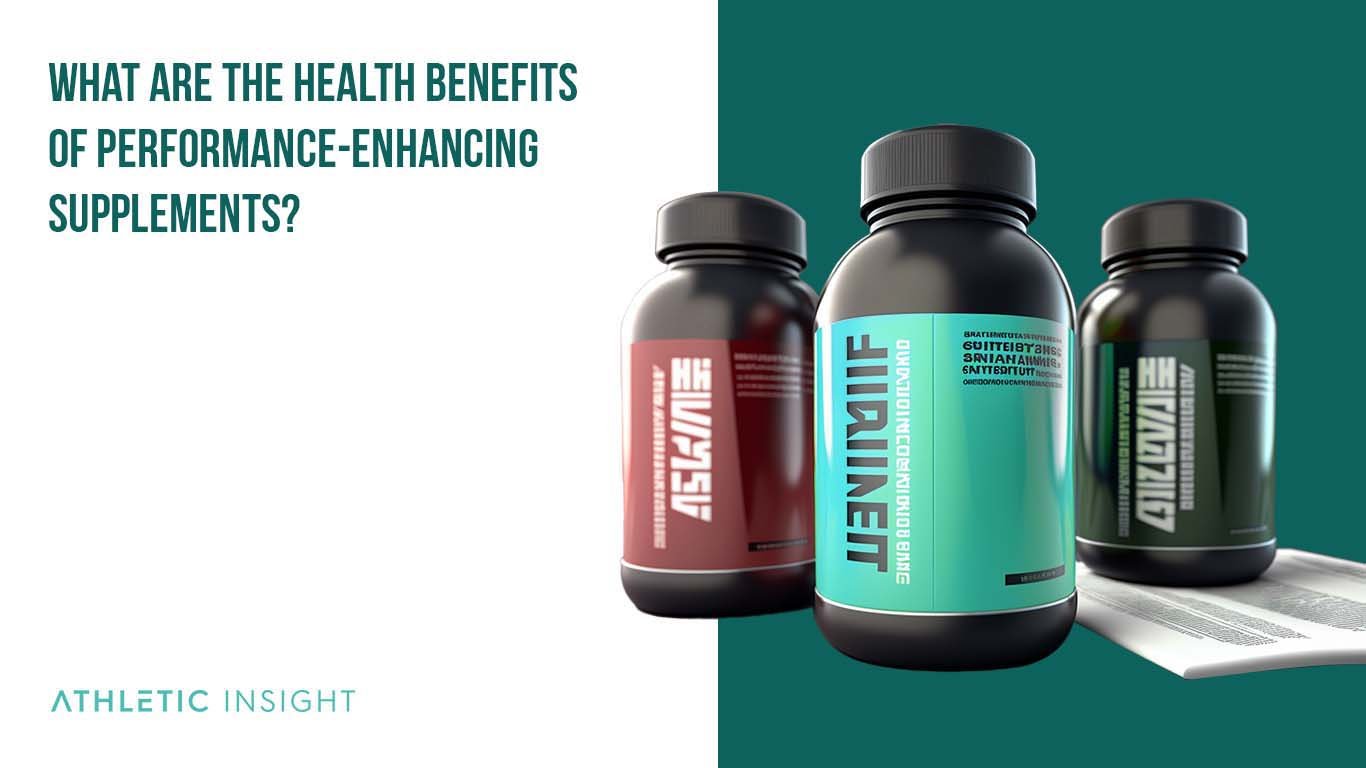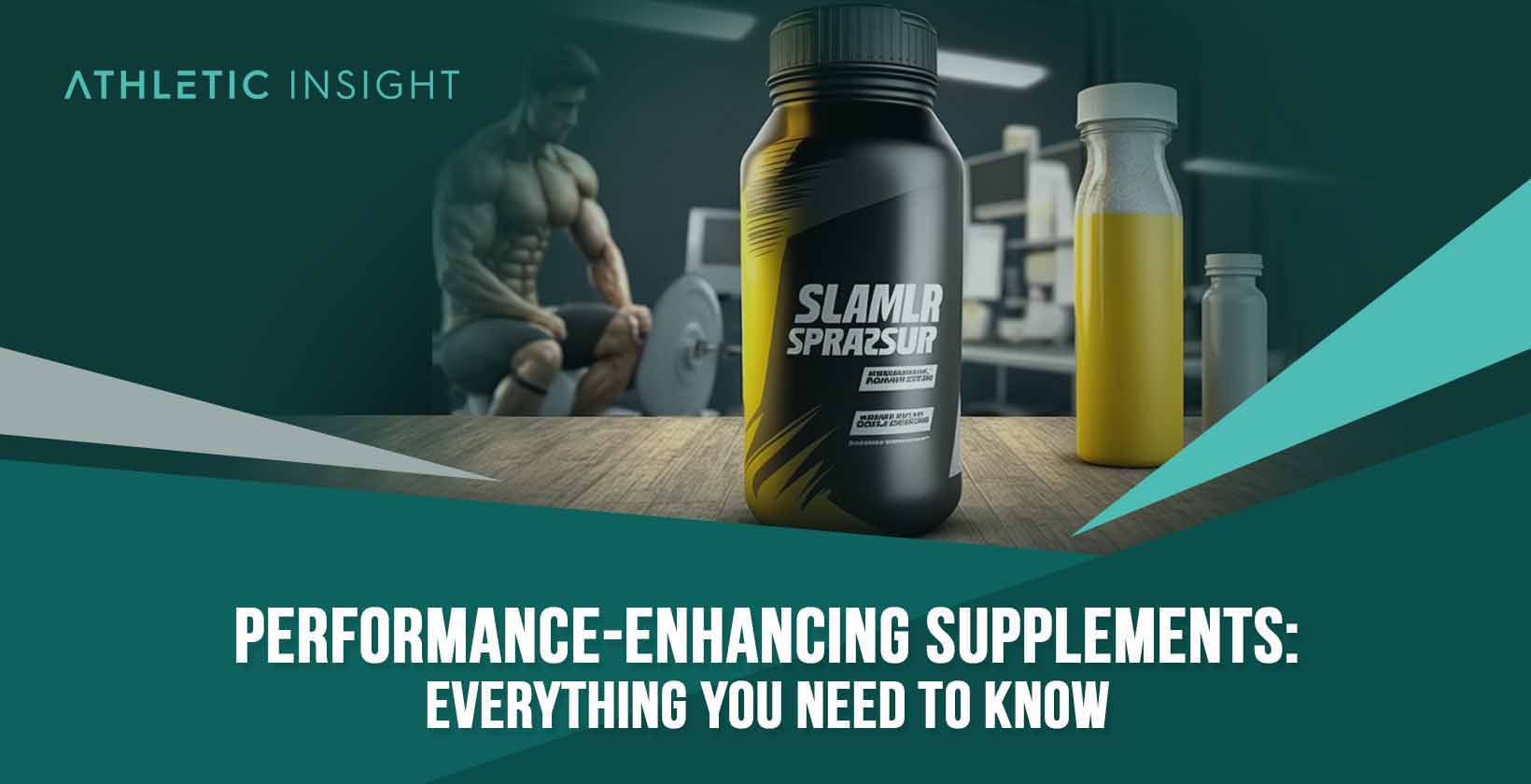Performance-enhancing supplements are increasingly popular among athletes and fitness enthusiasts, as they seek to gain a competitive edge and improve their physical performance. In this comprehensive guide, the various types of performance-enhancing supplements, their benefits, potential drawbacks, and legalities will be discussed, as well as the alternatives to these supplements for optimal athletic performance.
What is a Performance-Enhancing Supplement?
A performance-enhancing supplement is a product designed to improve an individual’s athletic ability or physical performance. These supplements come in various forms, including powders, pills, and liquids. They may be consumed to augment strength, endurance, speed, or other aspects of physical prowess. While many athletes and fitness enthusiasts utilize these supplements, it is important to note that some substances are banned or regulated in certain sports or athletic organizations.

What Do Performance-Enhancing Supplements Do?
Performance-enhancing supplements provide various benefits depending on their ingredients and formulation. They may enhance muscle growth, aid in recovery, increase energy levels, or improve focus and concentration. By supporting these aspects of physical performance, these supplements help athletes train harder, recover faster, and ultimately perform better in their chosen sport or activity.
Why Do Sports Athletes Use Performance-Enhancing Supplements?
Athletes use performance-enhancing supplements to gain a competitive edge, overcome plateaus, and optimize their training outcomes. These supplements can help athletes achieve their goals faster and more efficiently, allowing them to excel in their sport and, in some cases, achieve record-breaking feats. As such, the use of performance-enhancing supplements has become pervasive in various athletic disciplines.
What Are the Different Types of Performance-Enhancing Supplements?
There are numerous types of performance-enhancing supplements available, each with unique benefits and potential drawbacks. Some of the most common types include protein, human growth hormones, beta blockers, vitamins and minerals, anabolic steroids, creatine, energy drinks and stimulants, diuretics, and blood doping.
- Protein
- Human Growth Hormone
- Beta Blockers
- Vitamins and Minerals
- Anabolic Steroids
- Creatine
- Energy Drinks and Stimulants
- Diuretics
- Blood Doping
1. Protein
Protein supplements, often in the form of whey or plant-based protein powders, support muscle growth and repair. Adequate protein intake is crucial for athletes, as it helps them build and maintain lean muscle mass. While protein supplements are generally safe and effective, it is important to consume them in moderation and ensure a balanced diet. Protein supplements are not regulated, but they are not prohibited in most sports.
2. Human Growth Hormone
Human growth hormone (HGH) stimulates cell growth, reproduction, and regeneration. Some athletes use HGH to improve muscle growth, increase strength, and enhance recovery. However, HGH is associated with various side effects, such as joint pain, carpal tunnel syndrome, and increased risk of certain cancers. HGH is regulated and prohibited in most sports, as it poses significant health risks and can provide an unfair advantage.
3. Beta Blockers
Beta blockers are medications that reduce heart rate and blood pressure, resulting in a calming effect. They are often used in sports that require steadiness and focus, such as archery or shooting. While they can be helpful in reducing performance anxiety, beta blockers are associated with side effects, including dizziness, fatigue, and gastrointestinal issues. Beta blockers are regulated and prohibited in many sports, as they can be performance-enhancing and pose health risks.
4. Vitamins and Minerals
Vitamins and minerals, such as iron, calcium, and vitamin D, are essential for optimal health and athletic performance. Athletes may consume these nutrients in supplement form to prevent deficiencies and support various bodily functions, such as energy production, bone health, and immune function.
While vitamins and minerals are generally safe and beneficial, excessive intake can lead to adverse effects. These supplements are not typically regulated or prohibited, but athletes should consult with a healthcare professional to determine appropriate dosages and avoid potential interactions.
5. Anabolic Steroids
Anabolic steroids are synthetic compounds that mimic the effects of testosterone, promoting muscle growth and strength. While they can be effective in enhancing athletic performance, anabolic steroids are associated with numerous health risks, including liver damage, heart problems, and hormonal imbalances. Anabolic steroids are regulated and prohibited in most sports due to their potential for abuse and significant health hazards.
6. Creatine
Creatine is a natural compound that helps supply energy to muscle cells, improving strength and power output. It is a popular supplement among athletes seeking to increase their physical performance. Creatine is generally considered safe when used appropriately, but it may cause gastrointestinal issues and muscle cramping in some individuals. It is not regulated or prohibited in most sports, as it is found naturally in certain foods and poses minimal risks when used correctly.
7. Energy Drinks and Stimulants
Energy drinks and stimulants, such as caffeine and guarana, are often used by athletes to boost energy levels, improve focus, and delay fatigue. While they can be effective in enhancing performance, excessive consumption may lead to side effects, including heart palpitations, insomnia, and anxiety. Some stimulants are regulated or prohibited in certain sports, as they can pose health risks and provide an unfair advantage. Athletes should consult with their governing bodies to determine the allowed use of these substances.
8. Diuretics
Diuretics are substances that increase urine production, promoting fluid loss and weight reduction. Some athletes use diuretics to meet weight requirements in sports with weight classes or to mask the presence of banned substances in drug tests. However, diuretics can cause dehydration, electrolyte imbalances, and kidney damage. They are regulated and prohibited in most sports due to their potential for abuse and associated health risks.
9. Blood Doping
Blood doping involves increasing the oxygen-carrying capacity of the blood, typically through erythropoietin (EPO) injections, synthetic oxygen carriers, or blood transfusions. This practice can improve endurance and aerobic performance but is associated with serious health risks, such as blood clots, heart attacks, and strokes. Blood doping is strictly regulated and prohibited in most sports due to its dangerous nature and potential to provide an unfair advantage.
Are All Performance-Enhancing Supplements Regulated by the FDA?
No, not all performance-enhancing supplements are regulated by the FDA. Some supplements, such as vitamins and minerals, are subject to FDA oversight, while others, like anabolic steroids, are classified as controlled substances and are subject to more stringent regulation. It is crucial for athletes to research their chosen supplements and consult with a healthcare professional to ensure compliance with regulations and prioritize safety.
What Are the Banned Performance-Enhancing Supplements?
Banned performance-enhancing supplements vary by sport and governing body. Some commonly prohibited substances include anabolic steroids, HGH, beta blockers, diuretics, and blood doping agents. Athletes should familiarize themselves with the specific regulations of their sport to avoid inadvertently using banned substances and facing penalties.
How to Choose the Best Performance-Enhancing Supplements?
To choose the best performance-enhancing supplements, athletes should consider the following steps.
- Determine specific performance goals and identify the appropriate supplements that can help achieve those goals.
- Research the safety and effectiveness of each supplement by reviewing scientific studies and consulting with healthcare professionals or sports nutritionists.
- Evaluate the quality of the supplement by selecting products from reputable manufacturers that undergo third-party testing for purity and potency.
- Consult with the governing body of the sport to ensure that the chosen supplements are not prohibited or regulated in any way.
- Monitor the body’s response to the supplement, adjusting dosages or discontinuing use if adverse effects occur.
What Are the Best Performance Enhancing Supplements for Athletes?
Some of the best performance-enhancing supplements for athletes include creatine, protein, beta-alanine, BCAA’s, and beetroot juice.
- Creatine: Improves strength, power output, and muscle mass.
- Protein: Essential for muscle growth, repair, and recovery.
- Beta-alanine: Enhances endurance and reduces muscle fatigue.
- Branched-Chain Amino Acids (BCAAs): Supports muscle recovery and reduces muscle soreness.
- Beetroot juice: Increases nitric oxide production, enhancing blood flow and oxygen delivery to muscles.
These supplements have demonstrated benefits in athletic performance and are generally considered safe when used appropriately.
What Are the Best Performance Enhancing Supplements for Cyclists?
Some of the best performance-enhancing supplements for cyclists include beta-alanine, sodium bicarbonate, beetroot juice, caffeine, and BCAA’s.
- Beta-alanine: Increases muscular endurance and delays fatigue.
- Sodium bicarbonate: Helps buffer lactic acid, improving high-intensity performance.
- Beetroot juice: Enhances blood flow and oxygen delivery to muscles, supporting endurance.
- Caffeine: Boosts energy levels, focus, and reaction time.
- Branched-Chain Amino Acids (BCAAs): Promotes muscle recovery and reduces soreness after intense rides.
These supplements are particularly beneficial for cyclists due to their effects on endurance, energy, and recovery. However, cyclists should consult with a healthcare professional to ensure proper use and compliance with any applicable regulations.
What Are the Best Performance-Enhancing Supplements for Bodybuilding?
Some of the best performance-enhancing supplements for bodybuilders include protein, creatine, HMB, BCAA’s, and L-carnitine.
- Protein: Supports muscle growth, repair, and recovery.
- Creatine: Enhances strength, power, and muscle mass.
- Beta-hydroxy-beta-methylbutyrate (HMB): Prevents muscle breakdown and promotes muscle growth.
- Branched-Chain Amino Acids (BCAAs): Supports muscle recovery and reduces muscle soreness.
- L-carnitine: Facilitates fat metabolism, providing energy and promoting lean muscle mass.
Bodybuilders can benefit from these supplements due to their effects on muscle growth, strength, and recovery.
What Are the Best Performance-Enhancing Supplements for Exercise?
Some of the best performance-enhancing supplements for general exercise include protein, creatine, beta-alanine, caffeine, and electrolytes.
- Protein: Essential for muscle growth, repair, and recovery.
- Creatine: Improves strength, power output, and muscle mass.
- Beta-alanine: Enhances endurance and reduces muscle fatigue.
- Caffeine: Increases energy levels, focus, and fat metabolism.
- Electrolytes: Maintain proper hydration and support muscle function.
These supplements can help individuals optimize their workouts, enhance performance, and support recovery.
What Are the Best Performance-Enhancing Supplements for Women?
Some of the best performance-enhancing supplements for women include protein, iron, calcium, vitamin D, and BCAA’s.
- Protein: Supports muscle growth, repair, and recovery.
- Iron: Prevents iron deficiency anemia and supports energy production.
- Calcium: Essential for bone health and muscle function.
- Vitamin D: Promotes calcium absorption and supports immune function.
- Branched-Chain Amino Acids (BCAAs): Aids in muscle recovery and reduces muscle soreness.
These supplements are particularly beneficial for women due to their unique physiological needs and potential nutrient deficiencies. Women should consult with a healthcare professional to determine the right dosage and avoid potential interactions or adverse effects.
What Are the Best Performance-Enhancing Supplements for Runners?
Some of the best performance-enhancing supplements for runners include protein, beta-alanine, BCAA’s, electrolytes, and beetroot juice.
- Protein: Essential for muscle growth, repair, and recovery.
- Beta-alanine: Increases muscular endurance and delays fatigue.
- Branched-Chain Amino Acids (BCAAs): Supports muscle recovery and reduces muscle soreness.
- Electrolytes: Maintain proper hydration and support muscle function.
- Beetroot juice: Enhances blood flow and oxygen delivery to muscles, supporting endurance.
Runners can benefit from these supplements due to their effects on endurance, muscle recovery, and hydration.
What are the Ingredients of Performance-Enhancing Supplements?
Performance-enhancing supplements may contain a variety of ingredients, such as vitamins and minerals, amino acids, herbs and botanicals, enzymes, and probiotics.
- Vitamins and minerals
- Amino acids
- Herbs and botanicals
- Enzymes
- Probiotics
The most common ingredient found in performance-enhancing supplements is protein, as it plays a critical role in muscle growth, repair, and recovery.
1. Vitamin C
Vitamin C is an essential nutrient that supports immune function, collagen production, and antioxidant activity. It may also help reduce exercise-induced oxidative stress and support overall athletic performance.
2. Protein
Protein is a macronutrient composed of amino acids that are crucial for muscle growth, repair, and recovery. Consuming adequate protein is essential for athletes to optimize performance and prevent muscle breakdown.
3. Amino Acids
Amino acids are the building blocks of proteins and play a vital role in various physiological processes, including muscle synthesis, energy production, and neurotransmitter function. Some specific amino acids, such as branched-chain amino acids (BCAAs), are particularly beneficial for athletic performance and recovery.
4. Caffeine
Caffeine is a natural stimulant that can enhance energy levels, focus, and fat metabolism. The caffeine may also improve exercise performance and reduce the perception of effort during physical activity.
5. BCAA
Branched-Chain Amino Acids (BCAAs) consist of three essential amino acids: leucine, isoleucine, and valine. They are crucial for muscle recovery, reducing muscle soreness, and promoting muscle growth.
7. Citrulline
Citrulline is a non-essential amino acid that increases nitric oxide production, improving blood flow and oxygen delivery to muscles. It can enhance endurance, reduce muscle fatigue, and support overall athletic performance.
8. Beta-Alanine
Beta-alanine is a non-essential amino acid that helps increase carnosine levels in muscles. Higher carnosine levels can buffer muscle acidity, improving muscular endurance and reducing fatigue during high-intensity exercise.
What Are the Health Benefits of Performance-Enhancing Supplements?
Performance-enhancing supplements can provide several health benefits, including increased muscle strength and mass, improved endurance and stamina, enhanced recovery and reduced muscle soreness, optimized energy levels and mental focus, support for overall health and well-being.

- Increased muscle strength and mass
- Improved endurance and stamina
- Enhanced recovery and reduced muscle soreness
- Optimized energy levels and mental focus
- Support for overall health and well-being
These benefits can contribute to improved athletic performance and overall health, particularly when combined with a balanced diet and regular exercise.
What Are the Health Dangers of Performance-Enhancing Supplements?
While many performance-enhancing supplements are safe when used appropriately, some potential health dangers may arise from their misuse, such as the following.
- Overdosing on certain ingredients, leading to toxicity
- Interactions with medications or pre-existing medical conditions
- Adverse side effects or allergic reactions
- Dependence on stimulants or other potentially habit-forming substances
- Use of banned or unregulated substances, which may lead to disqualification in competitive sports
To minimize these risks, individuals should consult with healthcare professionals before using performance-enhancing supplements and follow recommended dosages and guidelines.
Are Performance-Enhancing Dietary Supplements Safe?
Yes, performance-enhancing dietary supplements can be safe when used appropriately and as directed by a healthcare professional. However, it is crucial to research the ingredients, potential side effects, and interactions with medications or pre-existing medical conditions before starting any supplementation regimen.
Do Performance-Enhancing Dietary Supplements Really Work?
Yes, many performance-enhancing dietary supplements have been shown to be effective in improving various aspects of athletic performance, such as muscle strength, endurance, and recovery. However, individual results may vary, and not all supplements will be effective for every person or sport. It is essential to choose high-quality supplements backed by scientific research and consult with a healthcare professional for personalized advice.
Are Performance-Enhancing Supplements Allowed in Sports?
Some performance-enhancing supplements are allowed in sports, while others are banned or restricted due to concerns about safety, fairness, or potential health risks. Athletes should familiarize themselves with the rules and regulations of their specific sport or competition to ensure compliance with any applicable guidelines.
What is the Alternative for Performance-Enhancing Supplements?
Alternatives to performance-enhancing supplements include natural performance enhancers, such as the following.
- A well-balanced diet rich in whole foods, including lean proteins, complex carbohydrates, and healthy fats
- Adequate hydration
- Proper sleep and stress management
- Regular exercise, including strength training and cardiovascular activities
- Mind-body techniques, such as yoga or meditation, to improve focus and mental resilience
Can a Well-Balanced Diet Be an Alternative to Performance-Enhancing Supplements?
A well-balanced diet can provide many of the essential nutrients needed to support athletic performance and overall health. While some athletes may still benefit from specific performance-enhancing supplements, focusing on a nutrient-dense diet, proper hydration, and adequate sleep can significantly contribute to improved performance and recovery without relying solely on supplementation.



